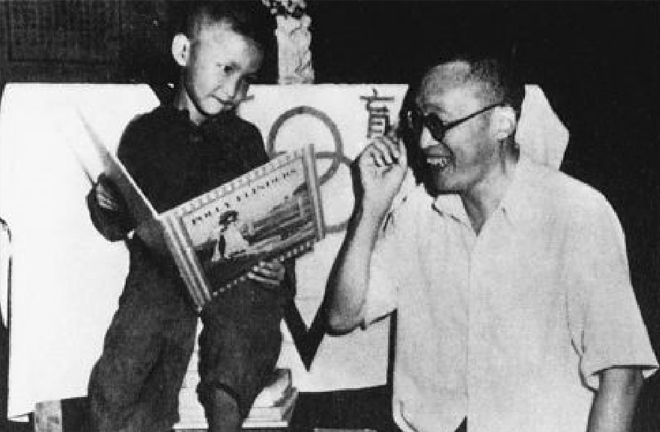Tao Xingzhi’s belief in learning still relevant today

Tao Xingzhi (right) together with a student from primary school Photo: FILE
Tao Xingzhi (1891–1946), a native of Shexian County, Anhui Province, is a famous educator and thinker in modern China. He devoted all his life to advocating for truth and learning, and he spent a lifetime on the education of the common people both in theory and in practice. Tao set up the model of modern education in China. His spirit is respected by all people and his approach to studying still has important reference value in contemporary times.
First, Tao’s learning principle is to revere freedom in the pursuit of truth and to take being an authentic person as the ultimate goal. In 1914, Tao went to the United States to study education under the tutorage of John Dewey, Paul Monroe, Willian Heard Kilpatrick and other American educators. Influenced by American progressives, Tao believed that “the purpose of freedom is to make people know their own nature and not be subject to others. At the same time, they must respect the freedom of their opponents and tolerate their opinions.” To him, intellectuals need to have an independent personality, a basic living, and a loose and free environment. It can be seen that “free learning” in Tao’s eyes is the individuals’ ability to adhere to the principles of “self-restraint“ and not be influenced by “authority” after setting goals in learning. In 1925, Tao gave a lecture entitled “Learning to be a Person” at the Nankai School, in which he emphasized that young individuals in an independent society should learn to “be a whole person,” the prerequisites for which are to have “a healthy body, an independent mind and a self-reliant career.”
Second, influenced by the idea that “knowledge and action are one” from Chinese philosopher Wang Yangming of the Ming Dynasty, Tao considered practice to be the basis of cognition and knowledge to originate from practice. “Knowledge can be both true and false. The knowledge produced by the combination of thought and action is true knowledge, which is uprooted in experience. Insight thus sprouts from experience, blossoms and yields fruit.” He emphasized that students should learn through practice and pursue truth through hands-on participation in truth. “No matter what knowledge and skills they have, they should receive them by their own initiative rather than passively.” As Tao pointed out in his lecture titled “Education for Creation” delivered in 1933, “Only in the process of action can people encounter difficulties, and when they find it difficult, they try to solve it. Then new values are thus produced.” He made a very figurative analogy of knowing and doing: “Action is the father, knowledge is the son, and creation is the grandson.”
Third, Tao stresses a scientific learning method, and advocates “teaching, learning and doing” as an integrated whole. In March 1927, Tao founded Xiaozhuang Normal School. There was neither a rigid classroom system nor diversified classroom teaching. Instead, he creatively divided the teaching activities into science, literature, politics, art, agronomy, medicine and health care, and rural construction, and he invited a group of professors and experts from outside the school to instruct “teaching, learning and doing” activities. Specific measures included students taking turns to undertake and deal with school affairs, such as sending and receiving documents, receiving guests, book management, accounting, instrument preservation, buying and cooking vegetables, chopping wood and carrying water, etc., in order to train students’ management, self-learning and living abilities. Tao also proposed that “he who teaches others teaches himself first.” He was also involved in buying vegetables, cooking, cleaning, and other specific matters of the school. He also put forward the “five-way” learning method: “experience, read books, seek teachers, visit friends and think.”
Fourth, a renowned modern educator, Tao always kept a humble mind and adhered to the principle of “study, study and study again” all his life. He kept writing and became a shining example of Chinese intellectuals. At the same time, he urged the younger generation to learn modestly and pursue lifelong learning. Regarding the importance of learning, Tao put forward that “as the time and society are progressing, occasional stagnation will make one fall behind! So we must learn in time.” He said that “teachers should teach and learn at the same time. They cannot just sell the same knowledge for a lifetime.” In Tao’s opinion, knowledge is constantly updated and learning is endless. For a person to become a “long-term modern person,” they must learn from all the objects they can learn with the perseverance and courage of “learn for life and live for learning”, and “he will not graduate until he “enters the coffin.” Tao also encouraged young students to stay connected to the people, live with the masses, take ordinary people as their teachers, and “learn not only the people’s language and feelings, but also their virtues.” Only by experiencing, understanding and feeling their happiness and sadness, weal and woe, can one make continuous progress and further sublimate one’s spirit.
Gao Yan is from the School of Education from the Xi’an International Studies University.
edited by BAI LE
